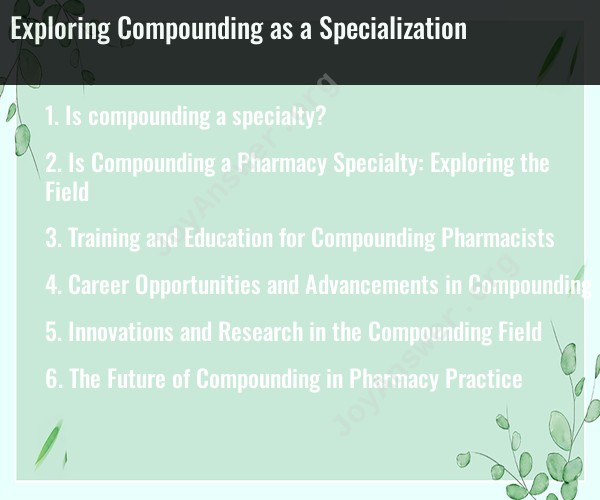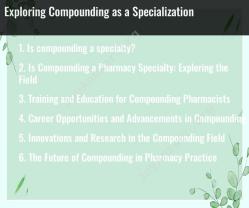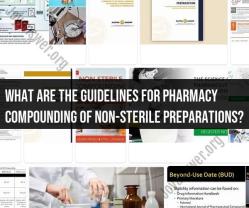Is compounding a specialty?
Compounding is considered a specialized field within the pharmacy profession. Compounding pharmacists are healthcare professionals who focus on the preparation of customized medications for individual patients when commercially available medications do not meet their specific needs. This specialization involves the blending, mixing, and manipulation of pharmaceutical ingredients to create unique dosage forms and formulations tailored to the patient's requirements.
Here are some key points highlighting compounding as a specialization:
Specialized Knowledge and Skills: Compounding pharmacists have specialized knowledge and expertise in pharmaceutical compounding techniques, drug stability, dosage forms, and the properties of various pharmaceutical ingredients. They understand the science of compounding and the art of creating tailored medications.
Custom Medications: Compounding pharmacists create medications that are not readily available in standard, commercially manufactured forms. This can include adjusting dosages, removing allergenic ingredients, or preparing medications in alternative forms (e.g., creams, suppositories, or liquids) to suit individual patient needs.
Training and Education: Pharmacists who specialize in compounding often pursue additional education and training in this field. Some may obtain certification in compounding to ensure they are proficient in compounding techniques and adhere to the necessary regulations.
Quality and Safety Standards: The preparation of compounded medications is subject to strict regulations and quality standards to ensure patient safety. These standards include guidelines from organizations like the United States Pharmacopeia (USP) and regulatory oversight from agencies like the FDA.
Patient-Centric Care: Compounding pharmacists focus on providing patient-centric care by tailoring medications to meet individual patient needs. This approach can improve patient outcomes and satisfaction, as it addresses specific medical requirements.
Diverse Applications: Compounding pharmacists can work in various healthcare settings, including compounding pharmacies, hospitals, long-term care facilities, and specialized clinics. They may be involved in preparing sterile compounds, non-sterile compounds, hormone replacement therapy, pediatric formulations, and more.
Advancements and Research: Compounding is a field that continues to evolve with advancements in pharmaceutical science and research. Compounding pharmacists often stay up-to-date with the latest developments to provide the best possible solutions for patients.
It's important to note that the scope and regulations of compounding may vary from one country to another, and pharmacists specializing in compounding must be knowledgeable about the specific regulations and guidelines applicable in their region. In the United States, for example, the Drug Quality and Security Act (DQSA) and the USP provide important regulatory guidance for compounding practices.
Is Compounding a Pharmacy Specialty
Whether or not compounding is a pharmacy specialty is a topic of debate. Some pharmacists argue that compounding is a core skill of all pharmacists, while others argue that it is a specialized area that requires additional training and experience.
The American Pharmacists Association (APhA) does not currently recognize compounding as a specialty. However, the APhA does offer a number of resources and training programs for compounding pharmacists.
The Board of Pharmacy Specialties (BPS) also does not currently recognize compounding as a specialty. However, the BPS has a Compounding Committee that is exploring the possibility of creating a compounding specialty.
Training and Education for Compounding Pharmacists
While there is no formal specialty certification for compounding pharmacists, there are a number of training and education programs available.
The APhA offers a number of compounding training programs, including the Compounding Certificate Program and the Compounding Residency.
The BPS also offers a compounding residency program.
In addition, there are a number of private organizations that offer compounding training programs.
Career Opportunities and Advancements in Compounding
Compounding pharmacists can work in a variety of settings, including community pharmacies, hospital pharmacies, and compounding-only pharmacies.
Compounding pharmacists have a number of career advancement opportunities. They can move into management positions, open their own compounding pharmacies, or become trainers and educators.
Innovations and Research in the Compounding Field
The compounding field is constantly evolving, with new innovations and research emerging all the time.
One of the most exciting areas of innovation in compounding is the development of new dosage forms. Compounders are now able to create customized medications in a variety of forms, including gels, creams, suppositories, and lollipops.
Another area of innovation is the development of personalized medications. Compounders can now create medications that are tailored to the specific needs of each patient.
Research in the compounding field is also ongoing. Compounders are developing new ways to compound medications and are studying the safety and efficacy of compounded medications.
The Future of Compounding in Pharmacy Practice
The future of compounding in pharmacy practice is bright. As the population ages and becomes more diverse, there is a growing need for customized medications. Compounders are well-positioned to meet this need.
In addition, the compounding field is constantly evolving, with new innovations and research emerging all the time. This means that compounding pharmacists will have many opportunities to learn and grow throughout their careers.
Overall, compounding is a challenging and rewarding area of pharmacy practice. Compounders play an important role in providing patients with access to customized medications.






